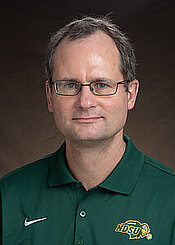What's it like to be an NSF Rotator?

The National Science Foundation (NSF) offers a chance for scientists, engineers, and educators to serve as temporary program directors or "rotators." According to the NSF, these individuals make recommendations about which proposals to fund; influence new directions in the fields of science, engineering, and education; support cutting-edge interdisciplinary research; and mentor junior research members.
For two years (2022-2023), NDSU Physics Chair and Professor Sylvio May worked as a rotator for the Condensed Matter and Materials Theory Program at the NSF's division of Materials Research. In addition, he was involved in several cutting-edge interdisciplinary research programs, new research initiatives, and programs that support early career scientists.
May offered his perspectives on the rotator program.
- What’s your background?
I’m a physicist by training, with expertise in theoretical research at the interface between soft matter and biophysics. I received my degrees from the Friedrich-Schiller University Jena in Germany and completed a postdoc at the Hebrew University in Jerusalem.
- When did you decide to become a rotator?
I got interested immediately after talking to an NSF program director who encouraged me to apply.
- What was the application process like?
Application and hiring turned out to be smooth. There is some paperwork before starting but NSF is very organized and efficient. Equally important, NDSU was highly supportive.
- What’s a day like as a rotator?
I was hired during the pandemic, so I worked remotely. Yet even in that setting, every day was packed with activities, from meetings with other program directors and staff across federal agencies to communications with reviewers and investigators. The NSF proposal review process is significantly more detailed and robust than I initially thought--only the tip of the iceberg is visible from outside!
- What was your biggest surprise or unexpected aspect of being a rotator?
The intensity of the daily work, the amazing dedication of NSF staff, and the constructive communications with PIs whose proposals were not funded all surprised me.
- What were your 3 major takeaways / benefits from being a rotator?
First, the opportunity of becoming a rotator was unexpected to me but doing it was an excellent decision. Second, being part of an organization that enables a significant amount of basic research in the U.S. is very rewarding despite the intense workload. Third, I’m now able to better appreciate the complexity of assessing the value of a research proposal.
- What did you learn about NSF that you didn’t know prior to being a rotator?
Looking back, it feels like I knew close to nothing about NSF prior to the role. So, my answer would be that all I learned was new.
- How do you think your time as a rotator will impact your career?
I now have new project ideas in my head and I hope I’ll find the time to carry some of them out.
- Would you do it again?
Yes, I would do it again. I have benefitted from all the support I've received since I came to the U.S. and I would like to give back.
Get more information about NSF Rotator programs (including how to apply).


